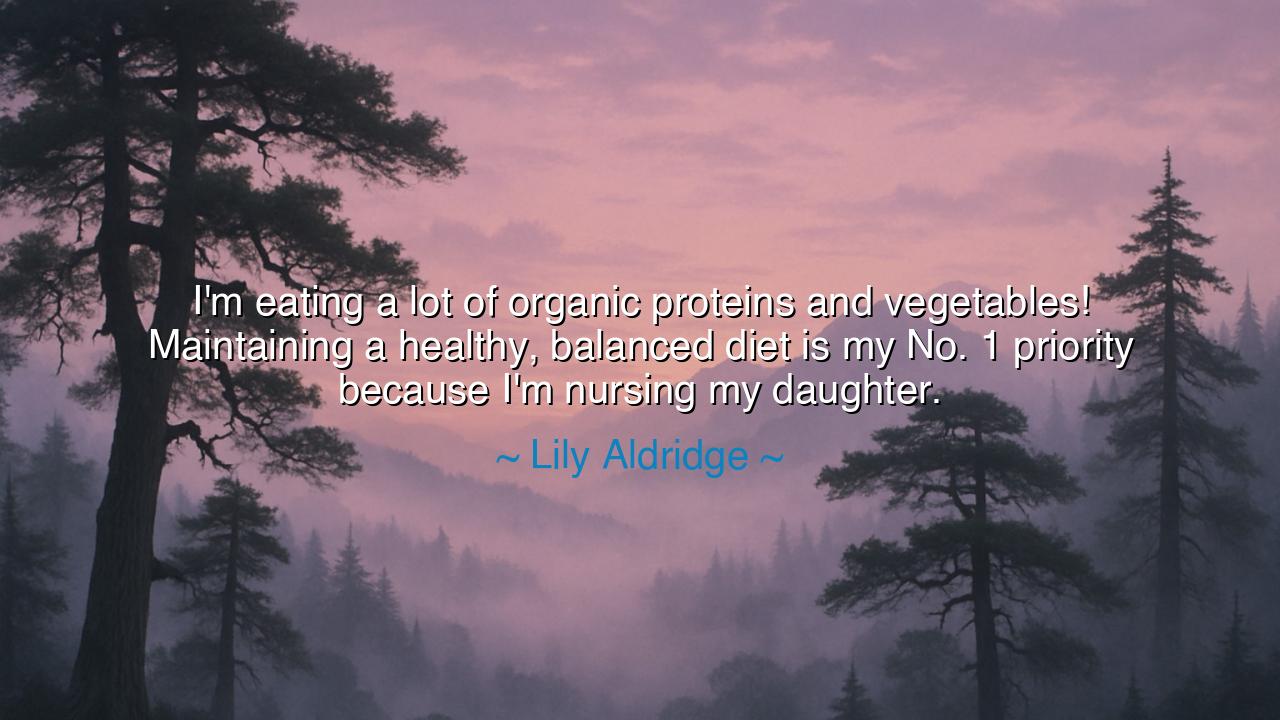
I'm eating a lot of organic proteins and vegetables! Maintaining
I'm eating a lot of organic proteins and vegetables! Maintaining a healthy, balanced diet is my No. 1 priority because I'm nursing my daughter.






"I'm eating a lot of organic proteins and vegetables! Maintaining a healthy, balanced diet is my No. 1 priority because I'm nursing my daughter." – Lily Aldridge
In these words, Lily Aldridge speaks not only as a mother, but as a guardian of life. Her statement, simple yet profound, reflects the timeless wisdom of nourishment, sacrifice, and balance. She recognizes that her body, once solely her own, has become a vessel of sustenance for another—a bridge between generations. In choosing organic proteins and vegetables, she honors the sacred link between the human spirit and the natural world. Her care is not an act of vanity, but of devotion. It is the eternal truth that life begets life, that health, when cultivated with love, becomes the foundation upon which the next life stands strong.
In ancient times, mothers were revered as the first physicians, the first teachers, the first nurturers of civilization. They understood, as Lily Aldridge does, that what one consumes shapes not only the body, but the future itself. Among the ancient Greeks, women who had recently given birth were fed carefully chosen foods—grains and herbs believed to fortify the milk and calm the spirit. The Romans honored the goddess Ceres, patroness of harvest and fertility, knowing that the well-being of mothers was the well-being of the nation. In this sacred cycle of nourishment, balance was key: the earth provided, the mother transformed, and the child flourished. Aldridge’s words echo this same sacred rhythm, one that has pulsed through humanity since time immemorial.
To speak of a balanced diet is to speak of harmony—between the inner and outer world, between nourishment and need. The proteins she mentions strengthen the body, while the vegetables bring purity, color, and life. Together, they represent the dual nature of all existence: the solid and the tender, the strength and the softness. Her dedication to maintaining this balance is an act of wisdom, for excess and neglect alike bring imbalance not only to the body but to the mind and spirit. Just as the ancients tended their gardens with care, trimming and watering with measured precision, so too must one tend the inner garden of health with attention and reverence.
Consider the story of Cornelia Africana, the noble Roman mother of the Gracchi brothers, known as the "Mother of Rome." When others flaunted their jewels and luxuries, Cornelia pointed to her sons and said, “These are my treasures.” She devoted herself to their education and well-being, ensuring they were strong in both body and mind. Her simplicity in living and her focus on their health became her legacy. So too does Lily Aldridge embody this spirit of devotion—choosing natural foods and mindful living not for vanity or glamour, but for the strength and vitality of her daughter. Her care is a modern reflection of the eternal truth: that the greatest beauty of a mother lies not in adornment, but in the quiet, constant act of giving.
Her emphasis on organic food speaks to another ancient understanding: the sanctity of the earth. To eat what is pure, unspoiled, and grown with care is to participate in a cycle as old as time. The philosophers of old saw no separation between food and virtue. Hippocrates, the father of medicine, taught that food itself was the first medicine—that the body, when fed with nature’s gifts, healed itself. When Aldridge chooses organic nourishment, she continues this ancient lineage of respect for the body and the soil. In doing so, she teaches that health is not merely the absence of illness, but the presence of harmony between person and planet.
Yet her quote also carries the quiet fire of responsibility—the recognition that love demands effort. To nurse a child is to give not only one’s milk, but one’s energy, one’s essence. It is a sacred exchange, where the health of one body shapes the destiny of another. In this act, the mother becomes a living symbol of sacrifice and renewal. She must be strong, not for herself alone, but for the life that depends upon her. And so, her “No. 1 priority” is rightly set—not on indulgence, nor on convenience, but on balance, care, and devotion.
The lesson for all who hear her words is clear: the way we care for ourselves is a reflection of how we honor life itself. Whether as parents, teachers, or creators, we all carry the duty to nurture what depends on us—be it a child, a dream, or the world itself. Let our diet—of food, thought, and action—be rich in what is natural and sustaining. Let us fill our days with what strengthens rather than weakens, with what heals rather than harms. And let us remember that true nourishment extends beyond the body, into the heart, the mind, and the soul.
So may Lily Aldridge’s words endure as a gentle reminder of an ancient truth: that to nourish oneself is to nourish the future. When we eat with awareness, live with gratitude, and care for the health of both our bodies and our world, we become vessels of continuity in the great chain of life. In this way, every meal becomes an offering, every act of care a legacy—and the balance we create within ourselves becomes the balance we bequeath to generations yet unborn.






AAdministratorAdministrator
Welcome, honored guests. Please leave a comment, we will respond soon